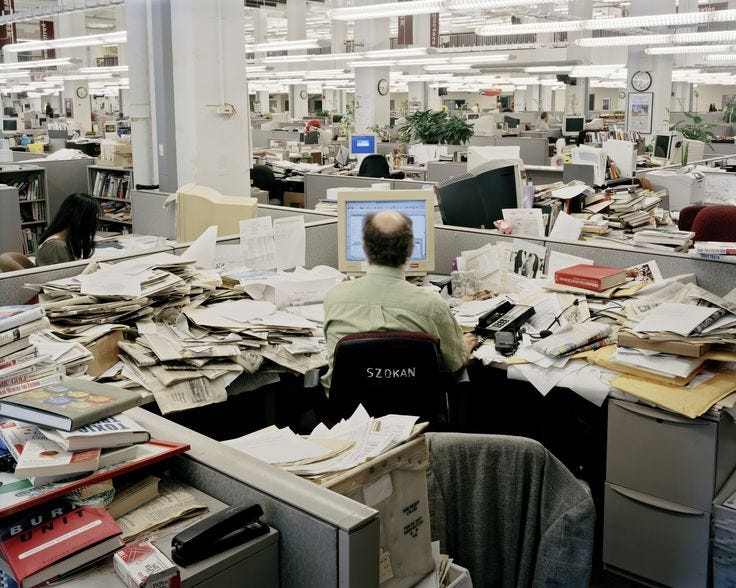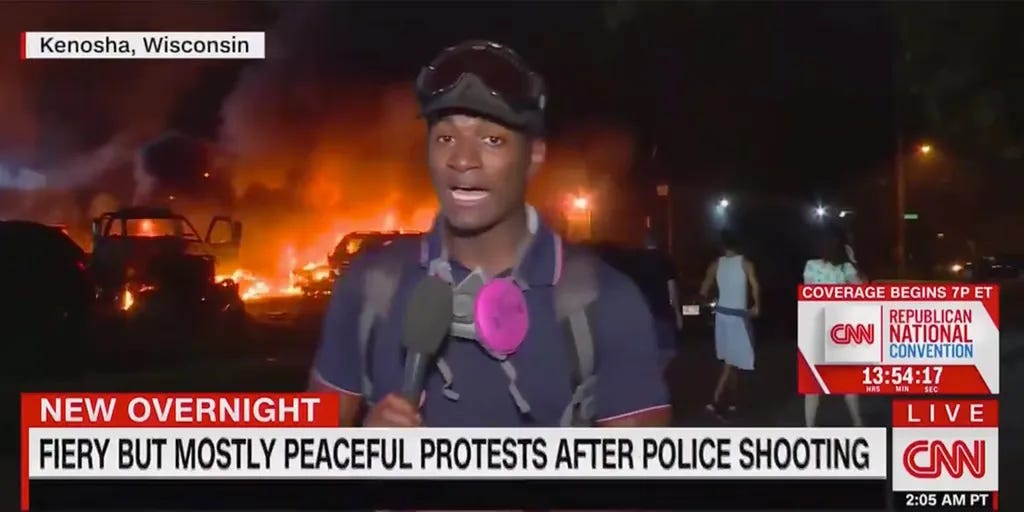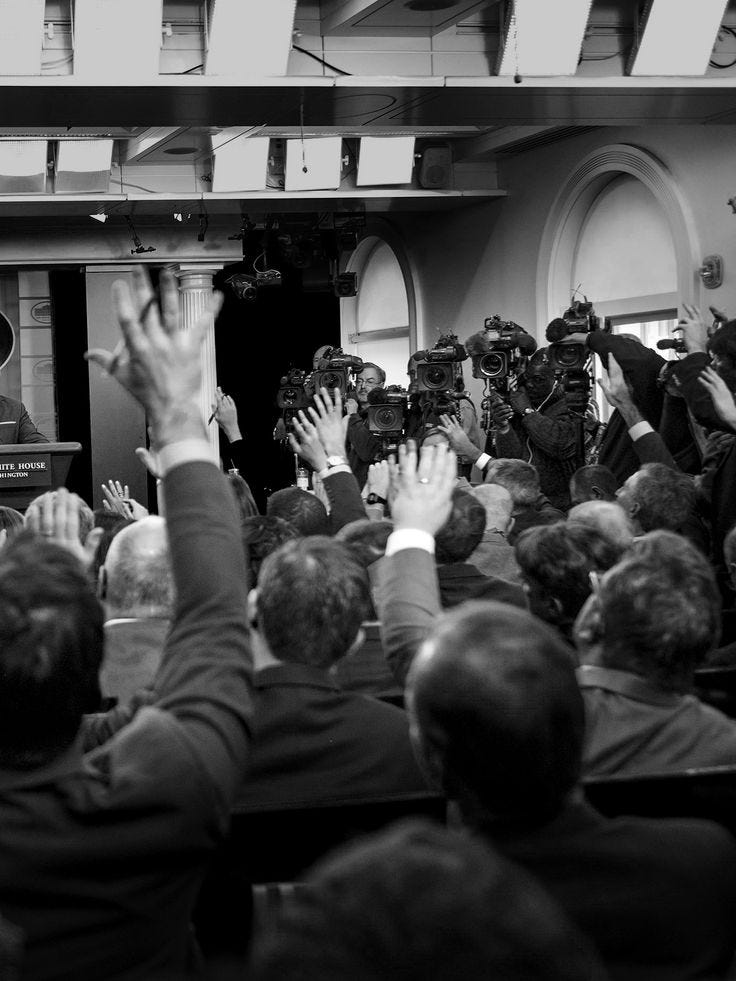Welcome to today’s edition of That's A Good Idea. If this is your first time reading, subscribe here.
One quick thing:
If there is a recent essay that has sparked your curiosity, given you a new idea, or in any way contributed positively to your daily life please consider supporting That’s A Good Idea with a $5 monthly subscription. I want, more than anything for TAGI to remain something you look forward to reading each week and your support helps me to gauge if I am on the right track. While I don’t write to make money, any small contribution is greatly appreciated. Additionally, if there is a specific topic, idea, or book you’ve read recently that you’d recommend me digging into, let me know in the comments below!
Now onto today’s edition…
Why Do Journalists Suck So Much?
After an Algerian migrant stabbed two adults and three children in Dublin on November 23rd, protests and riots broke out throughout the city.
The media told us that these protests ignited due to a global rise in racist and xenophobic language, fueled by the hatred and bigotry of Trump and other right-wing leaders. There is no context necessary to understand this violence and anger other than this.
Here is the first paragraph from the story The Washington Post ran the day after:
Right-wing protesters, angered by a stabbing attack they believed had involved someone of immigrant background, rampaged through central Dublin on Thursday night, leaving behind a trail of burning destruction.
They will not tell you that the social, political, cultural, and economic fabric of the small island nation is rapidly transforming and that Irish citizens are on edge. They will not tell you that the most popular boy’s name in the City of Galway is Muhammed. They will not tell you that one in three Irish citizens say they are “just getting by” financially. Nor will they tell you a shortage of housing and high inflation have been provoked by the States’ insistence on providing services and housing to the hundreds of thousands of migrants who have arrived in the country over the last decade years.
I am not attempting to persuade you that one culture is superior to another, nor am I trying to make a case for a white ethno-state. My point in highlighting this data and shift in demographics is to put my finger on the pulse of what a majority of Irish people already feel; unrepresented by the media institutions and politicians in which they have placed their trust.
A vast majority of Irish citizens are not racist, they simply want there to be limits and a proper vetting process for new migrants who enter the country. Something that the average shopkeeper or day laborer in Tehran, Tokyo, or Egypt would most likely agree with. A just and objective media would provide information that puts the rioter’s actions in context. They might give some brief statistics that give context to the big-picture issue or interview one of the protestors. At the very least they would use language that doesn’t invoke a specific moral prejudice.
Now, when a certain group or ideology is deemed by the media to be morally superior, the propaganda campaign turns counter-clockwise. No longer do these protestors “leave a trail of burning destruction”, they might “protest peacefully against police violence or structural racism”. Most of the time, these subtle linguistic shifts go right over the general public’s head, and that is what they are designed to do.
In August 2020, Jacob Blake a black man from Kenosha Wisconsin, broke into his ex-girlfriend’s apartment, sexually assaulted her, and then attempted to flee in her vehicle. When police responded to the scene, Blake argued with them before reaching into the vehicle to grab a knife. The officers shot Blake, leaving him paralyzed from the waist down.
The officers were not charged with a crime. In response, the city of Kenosha experienced widespread rioting and looting for a week.
The mainstream media did not provide context for the shooting, nor did they discuss Blake's extensive criminal background. They immediately made him a martyr, proclaiming once again, that the officer-involved shooting of Blake represented nothing more than America’s original sin of systemic racism. Here is the first paragraph of the USA Today cover story in the aftermath of the riots and shooting:
The police shooting of another Black man, this time in Kenosha, Wisconsin, has fueled additional alarm and anger over excessive use of force. Jacob Blake was shot seven times in the back Sunday by a seven-year veteran officer, authorities say.
Can you spot the propaganda?
In an attempt to do damage control during the riots, you might remember this ticker line CNN ran.
How is it that we’ve been shanghaied into believing that the media — the self-proclaimed arbiters of truth — pretend to speak on behalf of the people?
The Changing Face of Journalism
In the ‘50s and ‘60s, Journalism used to be a blue-collar, gritty, and low-paying job.
What happened?
Independent journalist Matt Taibi, who worked as a contributing editor at Rolling Stone for 20 years, described this shift in his book Hate Inc.
He writes:
In the '50s and '60s, journalism wasn't a profession. It wasn't something you went to college for - it was really more of a trade. You had a lot of guys who came up working in newspapers at the copy desk, or delivery boys, and then they would somehow become reporters afterward and learn on the job.
When Bob Woodward and Carl Bernstein broke the Watergate Scandal in 1972 journalism became sexy. There was a sudden allure for taking down corrupt politicians and peeling back the curtain on the ruling class of America. College students wanted to change the world, to stick it to the man, and to spread a different moral vision throughout the world — one that was new and equitable and fair.
In the ’80s and ‘90s ivy-league journalism programs began to attract the sons and daughters of bureaucrats, politicians, and wealthy tycoons. George W. Bush’s daughter Jenna and Bill Clinton’s daughter Chelsea both pursued careers in journalism, landing correspondent roles at NBC. Ronan Farrow and Anderson Cooper, both children of famous actors, went on to build successful media careers.
With the internet, everything changed.
As print journalism began to be destroyed by digital media, the industry began to centralize in the halls of power in the national media companies. This, in turn, attracted a more elite and well-connected class of ambitious, out-of-touch, young professionals. Local papers began to cut staff and outsource major stories to newswire services like the Associated Press and elite media positions became coveted symbols of authority.
As healthy middle-class jobs as reporters or editors for local or regional newspapers became scarce, the media industry consolidated from an every-man institution to a cathedral institution like finance and politics.
Escaping the Asylum
After sporadically publishing essays for magazines and think tanks like Areo and MacDonald-Lauier I got a part-time freelancing job at the San Francisco Standard.
Working primarily alongside the data editor, I combed through public data, wrote short listicles, and got to break a story on how the city’s broken economic incentives were ruining long-term development.
I worked with some competent, hardworking, and smart individuals who clearly knew more about the field than I did. But I saw, as a green outsider, that this was not a career path I wanted to take. Part of my responsibility as a new foot in the door was to pitch data and ideas to the editors that would make a compelling story. I combed through heaps of crime data, education records, and more in an attempt to showcase the serious failings of the city on these issues. At best, I received a cold shoulder to these ideas. I could only assume, based on the stories the editors chose to cover, that they had no interest in discussing or reporting on the failures of their city government. Failures that the ideology with which they aligned led to.
By the time I left to pursue a marketing career, the organization of the company was already undergoing a serious restructuring. Activist types straight out of their Masters Programs at Berkeley were immediately shuttled up the ladder and the focus on time-consuming data collection was pushed to the back burner.
While this organization was far from a dominant media empire like MSNBC or CNN, it reflected the same partisan programming.
Young and ambitious students receive a Master’s from an institution captured by progressive ideology and they get hired as a reporter or editor. For most journalists I spoke with, the job didn’t entail a reporting of objective facts, but rather, a shaping of context and truth to align with what is “right”.
And this is the core problem with media today.
The wrong truth is dangerous. Or so say those who shape it. And those uneducated masses who don’t understand what is the morally pure way to be, act, and think in the world, must be forced to see the world in the right way.
A major irony is that fewer people than ever trust the media. Focusing on an objective telling of the facts is not as sexy or polarizing, but that’s not what journalism was ever meant to be.
A major issue we will face, as AI and other forms of technology further shape our discourse, is finding ways to financially incentivize real people to tell real, and important stories.
Alternative media is gaining traction, we all have to make sure it stays that way.
As always, thanks for reading.
-Joe









